Related Research Articles

Begum Ra'ana Liaqat Ali Khan was the First Lady of Pakistan from 1947 to 1951 as the wife of Liaquat Ali Khan who served as the 1st Prime Minister of Pakistan. She was also the first female and tenth governor of Sindh. She was one of the leading woman figures in the Pakistan Movement, and a career economist, and prominent stateswoman from the start of the cold war till the fall and the end of the cold war.
The human rights situation in Cambodia is facing growing criticisms both within the country and from an increasingly alarmed international community. After a series of flagrant violations against basic human rights a feeling of incertitude regarding the direction the country is emerging, sometimes comparing the situation to a newborn Burma.
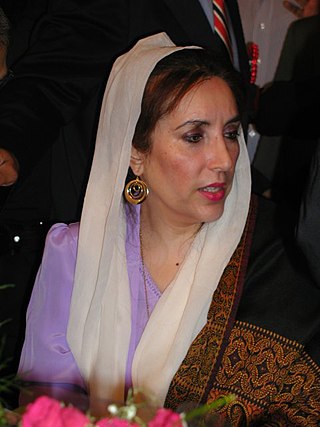
Women in Pakistan make up 48.76% of the population according to the 2017 census of Pakistan. Women in Pakistan have played an important role throughout Pakistan's history and they are allowed to vote in elections since 1956. In Pakistan, women have held high offices including that of the Prime Minister, Speaker of the National Assembly, Leader of the Opposition, as well as federal ministers, judges, and serving commissioned posts in the armed forces. Lieutenant General Nigar Johar, attaining the highest military post for a woman. Benazir Bhutto was sworn in as the first woman Prime Minister of Pakistan on 2 December 1988.
Nikah halala, also known as tahleel marriage, is a practice in which a woman, after being divorced by triple talaq, marries another man, consummates the marriage, and gets divorced again in order to be able to remarry her former husband. Nikah means marriage and halala means to make something halal, or permissible. This form of marriage is haram (forbidden) according to the hadith of Islamic prophet Muhammad. Nikah halala is practiced by a small minority of Muslims, mainly in countries that recognise the triple talaq.

Mehrangiz Kar, a human rights lawyer from Iran, is an internationally recognized writer, speaker and activist who advocates for the defense of women’s and human rights in Iran and throughout the Islamic world. A common theme in her work is the tension between Iranian law and the core principles of human rights and human dignity. She is also author of the book Crossing the Red Line, and an activist of women's rights in Iran. Born in 1944 at Ahvaz, in southern Iran, she attended the College of Law and Political Science at Teheran University. After graduating, she worked for Sazman-e Ta’min-e Ejtemaii and published over 100 articles on social and political issues.

Human rights in the Middle East have been shaped by the legal and political development of international human rights law after the Second World War, and their application to the Middle East. The 2004 United Nations Arab Human Development Report (AHDR) claimed that although Arab-Islamic tradition does hold unique importance for ideas of human welfare, History has proven that "they were not sufficiently prevalent in society to foster a culture based on a political contract, and allow for the legitimacy of differences of opinion, dialogue and transfer of power." Issues of the validity of democracy in the region and human rights are at the very centre of the challenges facing Middle Eastern society today.
Human rights in Kuwait are a topic of significant concern. Most notably, Kuwait's handling of the stateless Bedoon crisis has come under substantial criticism from international human rights organisations and the United Nations. Kuwait has the largest number of stateless people in the entire region. Kuwait also faces significant criticism for the human rights violations against foreign nationals, women, and LGBT people. Although Kuwaiti law theoretically pledges to protect all human rights; the enforcement mechanisms designed to help protect human rights are very limited in Kuwait.
Mads Andenæs KC is a legal academic and former UN special rapporteur on arbitrary detention and the chair of UN Working Group on Arbitrary Detention. He is a professor at the Faculty of Law of the University of Oslo, the former director of the British Institute of International and Comparative Law, London and the former director of the Centre of European Law at King’s College, University of London.

Lesbian, gay, bisexual, and transgender (LGBT) people in Pakistan face social difficulties compared to non-LGBT persons. Even in large cities, gays and lesbians have to be highly discreet about their sexual orientation. Pakistani law prescribes criminal penalties for same-sex sexual acts. The Pakistani Penal Code of 1860, originally developed under the British Raj, criminalises sodomy with possible penalties of prison sentences from two years to a life sentence and fines. Despite its illegality, homosexual acts are only occasionally prosecuted by authorities in Pakistan. Other morality and public order provisions in the Penal Code are however used to target LGBT Pakistanis.
The Working Group on Arbitrary Detention(WGAD) is a body of independent human rights experts that investigate cases of arbitrary arrest and detention. Arbitrary arrest and detention is the imprisonment or detainment of an individual, by a State, without respect for due process. These actions may be in violation of international human rights law.

Ansar Burney is a Pakistani human and civil rights activist and former Federal Minister for human rights in Pakistan’s cabinet from 2007 to 2008. He graduated with Masters in Law from Karachi University. He is widely credited as being one of the first people to introduce the concept of human rights in Pakistan since 1980.

Frances Raday is a Professor Emerita of Elias Lieberman Chair in Labor Law, Hebrew University of Jerusalem. Raday is currently a Professor of Law at the Haim Striks Law School at Colman College of Management Academic Studies, where she also acts as President of the Concord Center for Integration of International Law in Israel and as Head of the School's Graduate Programs.

Penelope (Penny) Andrews is a South African and American legal scholar.
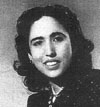
Aquila Berlas Kiani, also known as Aquila Kiani was a Professor of Sociology and an educator in social work. Born in British India, she later worked in Pakistan, the UK and the US. She served as Chairman of the Department of Sociology at the University of Karachi.
Violence against women, particularly intimate partner violence and sexual violence, is a major public health problem and a violation of women's human rights in Pakistan. Violence against women in Pakistan is part of an issue that faces the entire region the country is situated in. Pakistan is a highly patriarchal society, and took a long time to enact laws for the protection of women. In the 2019 Women, Peace and Security Index, Pakistan ranked 164 out of 167 countries. Pakistan is worst among nine South Asian countries on access to mobile phones, financial inclusion, and discriminatory norms for women. Around 12.2 million girls, compared with 10.6 million boys, remain out of school in Pakistan, poverty compounding challenges to girls' educational opportunities. The only positive to take from the Index was Pakistan's achievement of 20 per cent representation for women in parliament and a slightly better indicator than India on bias towards sons. In 2017 there were an estimated 746 honour crimes, 24 stove burnings, 18 cases of settlement marriages. Many cases go unreported, and many of these reported cases go unprosecuted. Alternative Dispute Resolution (ADR) system in 2017 has been hailed as a success in Khyber Pakhtunkhwa. Legal experts are critical of the system, noting that ADR can delay action. Many remain concerned with patriarchal influence in a decision-making process that has traditionally disadvantaged women. In 2019, the Ombudsman for Sindh province informed the Supreme Court that out of 350 cases, action was taken in just eight cases. The largest province, Punjab, has received 116 complaints since the establishment of the office in 2013, resulted in 42 convictions, 15 acquittals, 27 withdrawals, and 24 still ongoing cases. It also reviewed 13 appeals. Four decisions were set aside, five decisions upheld, two cases were declared time-barred, while two remain ongoing. Women in Pakistan mainly encounter violence by being forced into marriage, through workplace sexual harassment, domestic violence and by honour killings.
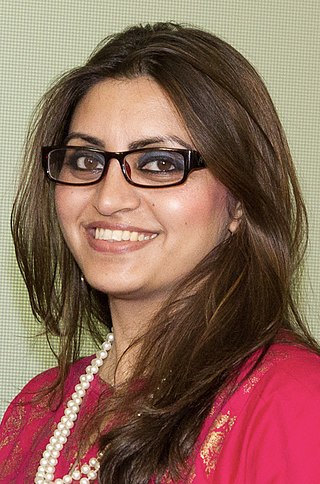
Gulalai Ismail is a Pashtun human rights activist from Khyber Pakhtunkhwa, Pakistan. She is the chairperson of Aware Girls, a global ambassador for Humanists International, and a leading member of the Pashtun Tahafuz Movement (PTM). She speaks on the subject of promoting peace and women's empowerment at conferences internationally, and is the recipient of the International Humanist of the Year Award, the Chirac Prize for Conflict Prevention, and the Anna Politkovskaya Award.
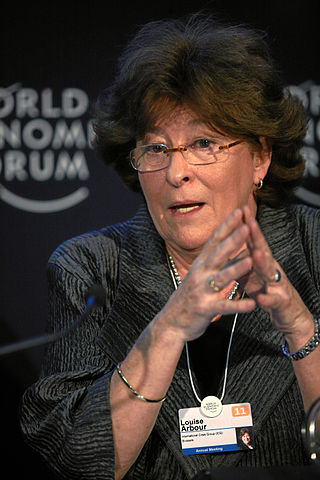
Women in law describes the role played by women in the legal profession and related occupations, which includes lawyers, paralegals, prosecutors, judges, legal scholars, law professors and law school deans.
Capital punishment in Bangladesh is a legal form of punishment for anyone who is over 16, however in practice will not apply to people under 18. Crimes that are currently punishable by death in Bangladesh are set out in the Penal Code 1860. These include waging war against Bangladesh, abetting mutiny, giving false evidence upon which an innocent person suffers death, murder, assisted suicide of a child, attempted murder of a child, and kidnapping. The Code of Criminal Procedure 1898 provides that "he be hanged by the neck until he is dead." For murder cases, the Appellate Division requires trial courts to weigh aggravating and mitigating factors to determine whether the death penalty is warranted.
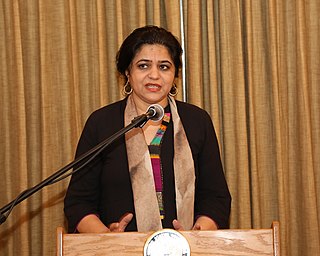
Sara Hossain is a leading Bangladeshi lawyer. She is a barrister in the Supreme Court of Bangladesh. Hossain is the honorary executive director of the Bangladesh Legal Aid and Services Trust (BLAST), a major legal aid provider. Hossain has been at the forefront of advocating for women's rights in Bangladeshi courts and played a key role in drafting legal reforms to protect women. She was the plaintiff's lawyer in the landmark case of Bangladesh National Women Lawyers Association (BNWLW) v. Bangladesh, in which the Supreme Court supported the judicial practice of referring to international human rights law in the absence of domestic legislation. She is known for her role in challenging fatwa violence when a fatwa is issued to mete out punishment to women and girls. Hossain co-edited 'Honour': Crimes, Paradigms and Violence Against Women with Lynn Welchman.
Javaid Rehman is a British-Pakistani legal scholar and Professor of Islamic Law and International Law at Brunel University London.
References
- ↑ Warwick scores legal first
- ↑ Protecting the World's Children
- ↑ Policy advocacy and partnerships for children's rights
- ↑ The Working Group on Arbitrary Detention - Members OHCHR.
- ↑ Conceptualising Islamic Law, CEDAW and Women’s Human Rights in Plural Legal Settings Archived 2011-07-21 at the Wayback Machine